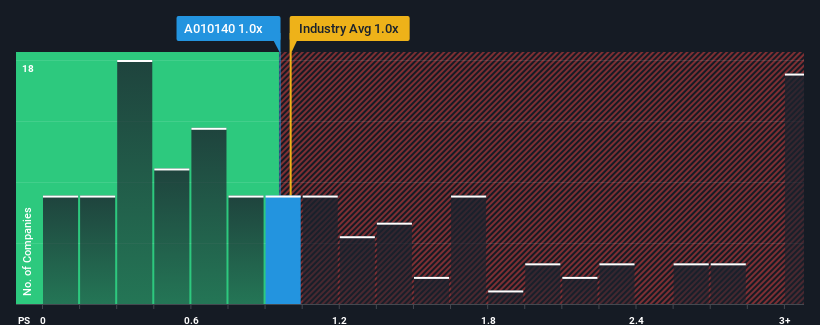- South Korea
- /
- Machinery
- /
- KOSE:A010140
Pinning Down Samsung Heavy Industries Co., Ltd.'s (KRX:010140) P/S Is Difficult Right Now

There wouldn't be many who think Samsung Heavy Industries Co., Ltd.'s (KRX:010140) price-to-sales (or "P/S") ratio of 1x is worth a mention when the median P/S for the Machinery industry in Korea is very similar. However, investors might be overlooking a clear opportunity or potential setback if there is no rational basis for the P/S.
View our latest analysis for Samsung Heavy Industries

What Does Samsung Heavy Industries' P/S Mean For Shareholders?
Samsung Heavy Industries certainly has been doing a good job lately as it's been growing revenue more than most other companies. One possibility is that the P/S ratio is moderate because investors think this strong revenue performance might be about to tail off. If you like the company, you'd be hoping this isn't the case so that you could potentially pick up some stock while it's not quite in favour.
If you'd like to see what analysts are forecasting going forward, you should check out our free report on Samsung Heavy Industries.How Is Samsung Heavy Industries' Revenue Growth Trending?
The only time you'd be comfortable seeing a P/S like Samsung Heavy Industries' is when the company's growth is tracking the industry closely.
Retrospectively, the last year delivered an exceptional 44% gain to the company's top line. Pleasingly, revenue has also lifted 32% in aggregate from three years ago, thanks to the last 12 months of growth. So we can start by confirming that the company has done a great job of growing revenue over that time.
Turning to the outlook, the next year should generate growth of 11% as estimated by the analysts watching the company. With the industry predicted to deliver 25% growth, the company is positioned for a weaker revenue result.
With this information, we find it interesting that Samsung Heavy Industries is trading at a fairly similar P/S compared to the industry. It seems most investors are ignoring the fairly limited growth expectations and are willing to pay up for exposure to the stock. These shareholders may be setting themselves up for future disappointment if the P/S falls to levels more in line with the growth outlook.
What We Can Learn From Samsung Heavy Industries' P/S?
Using the price-to-sales ratio alone to determine if you should sell your stock isn't sensible, however it can be a practical guide to the company's future prospects.
When you consider that Samsung Heavy Industries' revenue growth estimates are fairly muted compared to the broader industry, it's easy to see why we consider it unexpected to be trading at its current P/S ratio. When we see companies with a relatively weaker revenue outlook compared to the industry, we suspect the share price is at risk of declining, sending the moderate P/S lower. A positive change is needed in order to justify the current price-to-sales ratio.
Many other vital risk factors can be found on the company's balance sheet. Our free balance sheet analysis for Samsung Heavy Industries with six simple checks will allow you to discover any risks that could be an issue.
It's important to make sure you look for a great company, not just the first idea you come across. So if growing profitability aligns with your idea of a great company, take a peek at this free list of interesting companies with strong recent earnings growth (and a low P/E).
New: Manage All Your Stock Portfolios in One Place
We've created the ultimate portfolio companion for stock investors, and it's free.
• Connect an unlimited number of Portfolios and see your total in one currency
• Be alerted to new Warning Signs or Risks via email or mobile
• Track the Fair Value of your stocks
Have feedback on this article? Concerned about the content? Get in touch with us directly. Alternatively, email editorial-team (at) simplywallst.com.
This article by Simply Wall St is general in nature. We provide commentary based on historical data and analyst forecasts only using an unbiased methodology and our articles are not intended to be financial advice. It does not constitute a recommendation to buy or sell any stock, and does not take account of your objectives, or your financial situation. We aim to bring you long-term focused analysis driven by fundamental data. Note that our analysis may not factor in the latest price-sensitive company announcements or qualitative material. Simply Wall St has no position in any stocks mentioned.
About KOSE:A010140
Samsung Heavy Industries
Engages in the shipbuilding, offshore, and energy and infra businesses worldwide.
Good value with reasonable growth potential.


